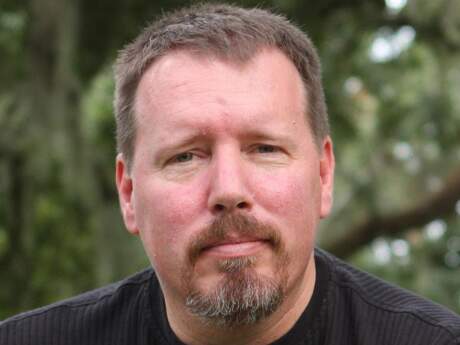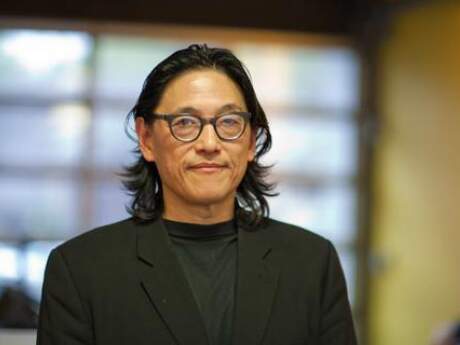Red, White, & Blue
Joshua Clover & Juliana Spahr
Two Poets on Politics
The questions in this forum are lovely in their seriousness, in their questioning of individualism, even as they make us bristle a little in that they presume that "poetry" and "politics" can be autonomous one from the other, that this is a choice. And even as we feel we can't answer them.
These questions do not describe the situation for us, neither the general situation of poetry and politics, nor the specific, present conjuncture. We wish to make a simple, practical observation here: we can certainly say that more poets were arrested in California this year than in any year in recent memory (if not ever). And this tells us something about this moment and also about the role of poets (and perhaps also thus of poetry) in this moment.
We hope we are not describing something that is only about California. We hope this is true in other places including the ten mile radius around the Poetry Society.
We suspect as well that more poets couldn't find jobs or pay debts than has been true in the near past. In this we suspect they are like those who are not poets. And from this unemployed and debt-steeped position, we are even so bold as to believe, more poets thought seriously about making massive, substantive changes than they have in the past few years, changes in how society is arranged regarding things like jobs and debts and jails. Then they stood at moments together and at moments alone and talked about this on the steps of various public plazas some holding megaphones and some holding the microphone from an unpermitted amplification system and some using their voices which then got echoed by the others. Some stood in the crowd or went marching down streets holding cardboard signs with pithy and poetic phrases written on them with a Sharpie. And for the most part they did not call it poetry even as they knew a great deal of the thinking and the motivation that got them there came from being a poet. And even as they did this standing or this marching in the supportive presence of other poets, in spaces made possible by other poets.
But were they poets in those moments? Certainly these people we are talking about, some of whom are us, are people who write poems. Certainly some of them got called "poets" when they acted as poets, working on poet's libraries and making poet's reports saying poems out loud after announcing that they were poems, sometimes even while General Assemblies were happening nearby as if these were substitutable things. And certainly some of them did other things, some went too far and did things that weren't poetry, they organized and blockaded and fought cops, and these ones got called "anarchists" and not "poets," and then people made evaluations about the presence of poets in politics, almost all of which were extremely silly, and someone weirdly agreed to publish these essays. It was a silliness that came in many ways from needing to save "poets" as a defined role, and from keeping "poetry" and "politics" as autonomous spheres.
A lot of your questions are about that thing that sometimes gets called "craft." What sorts of forms are best for some sort of political thinking? How are they political? We can imagine all sorts of interesting individual answers but no right answer to any of these issues. It is not the form that has gotten us to this place where more poets have been arrested than ever in California. It is not the poem either.
Rather the politics at this moment are significantly, perhaps radically different than they were five or thirty years ago. There is a crisis condition that differs from recent political history, not that it was ever rosy, and in some ways the crisis that is now cresting over the poetry-writing class in America emerged a good deal earlier and submerged other people in other places and classes.
So that's a big thing. Big enough that if we had our way, we would not start with an imagined poem hovering in the air above the rising waters and above our heads like an empty speech balloon, bugging us about whether or not we should fill it up with politics and what kind. And instead begin any conversation about politics and poetry and their hypothetical relation with the practical situation that poets and other humans find themselves in here and now, right here inside the hurly-burly of politics, with our comrades and strangers and so so many riot cops. And it is here that we would try to ask ourselves the question of what we could or might possibly someday do as humans who write poetry and also go to work and care for children and drink with friends and find ourselves and our beloveds at moments in the plaza and at other moments in the jail and in need of lawyers and a bail fund. And we would not assume the answer concerns poetry, although for many and probably for us, the answer will come out of the experience of thinking with poets and as people who sometimes write poems. And maybe this life that has involved poetry will turn out to be a kind of practice for this moment: we want to joke here about how everyone who is a poet has been training for years to endure interminable meetings and they are more ready than anybody for the long sit-ins that accompany organizing sessions with their plenitude of empty speech and occasional gems and yet their strange crushing necessity.
And we would like to say that we think poets have been very involved in politics this last year or three, and we believe they have been involved and committed in part because they are poets but that doesn't mean they have been involved only as poets. And this distinction seems crucial right now. It may be that the present situation asks us to give a lot of our time to other matters, and we write less poetry in this case, and that is the answer adequate to politics. But this is still what we do as people who write poetry — we are not renouncing this desire that is poetry by recognizing that politics sometimes wants other things of us. And it may be that we feel the need to engage the present situation with poems — that, again, does not make us more or less people who write poems. Maybe we are saying something as improbable as it is simple: that being a poet, if it is to be in any way meaningful, doesn't mean being a person who engages the world through poems. It means being a person who is in the world and for whom writing poems is one possibility in trying to figure out what is needed. It means recognizing the political as the case, as the situation, before we have been captured by the question that begins, "As poets...." We ask first: what does the situation need to help it along? Poems are neither the answer nor not.
* * *
Earth-N
The new time takes hold unevenly first in certain quarters and suburbs
In the end it becomes an instinct and how things have always been
Retcon appears in print first in 1974 the year of Jolene and the Metapolitefsi
The zone of expectation in the poem is to a render a relationship among these three things
Jolene is a beauty of two hundred and two words. Oh her auburn hair, ivory skin, eyes of emerald green. I am making her name in our sleep. What the heart most hopes will happen is to join forces.
Jolene is a bank teller in Earth-One.
In Earth-Two, she drives the tank through the gates of Polytechnic.
In Earth-Three, she becomes a structure of feeling, my feeling, even when these things are gone and I was saying, hell, you're spending a lot of time at the bank. I don't believe we've got that kind of money.
I can tell you how it felt.
It felt like every heroic journey
was being reversed
and everyone kept singing
her name again and again
Jolene, Jolene, Jolene, Jolene, Jolene, Jolene, Jolene, Jolene, Jolene, Jolene, Jolene, Jolene, Jolene, Jolene, Jolene, Jolene, Jolene, Jolene, Jolene, Jolene, Jolene, Jolene, Jolene, Jolene, Jolene, Jolene, Jolene, Jolene, Jolene, Jolene, Jolene.
Aeneas makes his circuitous way
back to Greece as the wall repairs itself.
In Earth-Four the nation is finally deserted.
Nothing here but us Acropolises.
It was a contextless country for us then
"as if a new planet had risen in the night."
We had been everywhere else
and we came for the waters
and we came for the low interest rates
and we came for the war
and we stayed for the lulz.
—The Ovsei-Bailey Tendency
Published September 2012.
***
Joshua Cloveris the author of The Totality for Kids (University of California), and is completing a poetry manuscript titled Tranche/Syntagma.
Juliana Spahr's most recent books are Well Then There Now (Black Sparrow Press) and, co-edited with Stephanie Young, A Megaphone: Some Enactments, Some Numbers, and Some Essays about the Continued Usefulness of Crotchless-pants-and-a-machine-gun Feminism (ChainLinks).


